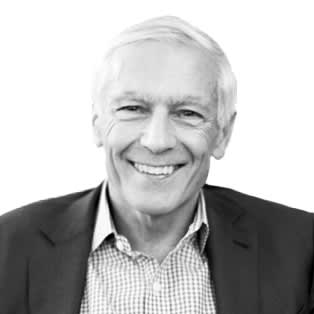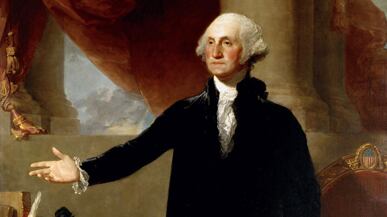Sure, almost any American youngster can identify the name of America's first president. For those who want more, there are plenty of biographies of George Washington. I've read many. But nothing quite like Ron Chernow's Washington has been available before.
Chernow recounts, quotes, sifts, analyzes and, ultimately brings judgment to bear. This is the real George Washington, as close as we can come to understanding a historical leader who made such an effort to protect his privacy and conceal his personal thoughts. Chernow has taken a prodigious amount of source material, including some recently released, to see deeply into the character of our nation’s first president and our Army's first commander in chief. And in the process he has crafted a life-story captivating in its details and riveting in its almost casual insights.
As developed by Chernow, Washington was a man of towering ambition—for responsibility, for wealth, for reputation, and, ultimately, for high office. His ambition grew organically, unfolding step by step, in response to challenges and opportunities, and it was a normal and natural outgrowth of his upbringing, his physical and emotional characteristics, and his intellect.
Interestingly, Washington was both scarred and propelled forward by deaths of those around him—father, brothers, sister-in-law, step-daughter, and others. Each death created its own challenges emotionally and practically, as he lost the love, support, and guidance that he naturally sought, but by each he was advanced in opportunities for service or personal wealth in ways that in hindsight seem fortuitous but were essential in shaping his later achievements.

Chernow's account revels in the details that formed the essence of his character and reputation—incredible physical stamina, strength, and courage. Braving freezing rivers, riding into the heat of battle, even physically intervening in a brawl among his troops, and excelling in what were then sporting events or manly contests.
Despite how he might come across in the history books, he wasn’t some bland, rule-following “high-integrity” automaton.
Washington was also well-aware of the impression he left on others, dressing just so, ordering the finest accoutrements for his uniform, and wearing it to good effect. Chernow reports the ladies swooning, the troops huzzahing, and his political and military rivals full of envy. Washington had "command presence," something that is both natural but really must also be learned, cultivated, and deliberate.
Chernow has really pierced the veil into Washington's intellect and his particularly brilliant command of details. His focus, reasoning, and decisiveness. But he also captures him cultivating relationships, charming and winning over others by his remarkable presence, a certain taciturn demeanor, and sometimes a sly, indirect approach that marked him as a skilled bureaucratic and political infighter of the highest order.
But it’s not an entirely rosy portrait with its evidence of a certain "dark side," too, showing his tendencies to be self-serving and acquisitive, even given sometimes to sharp practices and deception. Despite how he might come across in the history books, he wasn't some bland, rule-following "high-integrity" automaton.
Washington is revealed in depth, and, like most of us, he is a mass of seeming contradictions— almost avaricious in pursuit of wealth, more than reckless in gambling it all on the American Revolution, emotional, passionate inside, stoic outwardly, an aggressive commander who was forced to fight a defensive war, a natural political leader who masked his ambition in studied reluctance, and sought to bring out the best qualities of those around him.

Not an author to be dissuaded by length, Chernow takes the paragraphs and pages to prove his points and justify his conclusions. This is beautiful expository writing, a combination of detailed, spellbinding narrative, and zinging judgment. From topic sentence to supporting points and evidence to summary judgment: "Washington was well aware of the towering impression he made on horseback." "Throughout his life, he descried signs of heavenly approbation and seemed to know that he operated under the overarching guidance of a benign Providence." "Washington could never have married a poor woman, but neither could he have tolerated a cold and loveless marriage."
But Chernow also hits the big themes of the day, as he must, to bring us through them into both a deeper understanding of Washington's mind and character, and the milieu in which he lived—family and marriage, slavery, class, church and state—here, truly is the sense of the Founding Fathers, which seems to be on the lips of so many in politics and political theater.
How incredibly fortunate America was to have someone like George Washington emerge as a young man and mature into the extraordinary and towering figure who personified our country and its virtues.
This isn't an easy book to carry, at almost 900 pages. But it is an easy book to read, with crisp narrative, pertinent evidence, and sparkling insights, the reader returns again and again, seeking those elusive qualities of character and leadership in a single great man, without who our history would have been so different. This is a book for every American—a masterpiece of biography.
Plus: Check out Book Beast, for more news on hot titles and authors and excerpts from the latest books.
Wesley Clark (ret.) served in the United States Army for 34 years and rose to the rank of four-star general as NATO's supreme allied commander, Europe. He is the editor of Palgrave Macmillan's Great Generals Series and the author of A Time to Lead, as well as the bestselling books Waging Modern War and Winning Modern Wars. He lives in Little Rock, Arkansas.






